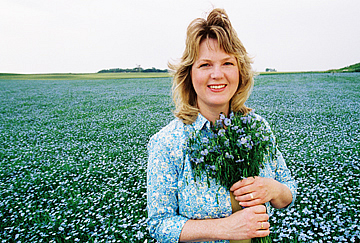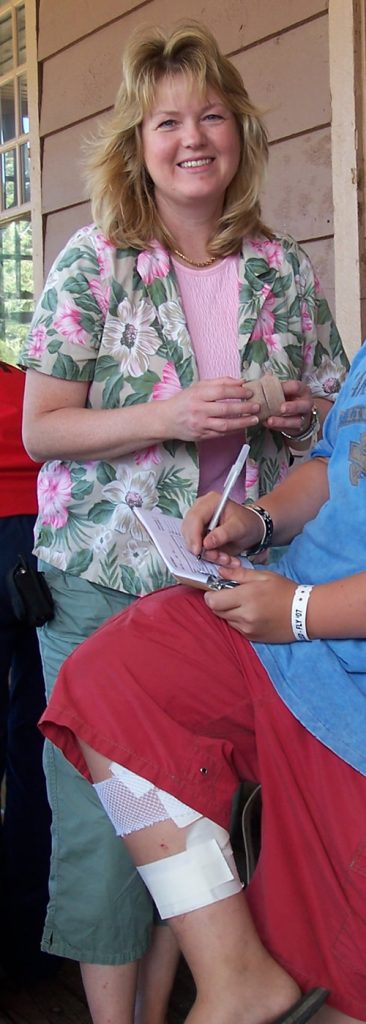As a Registered Nurse since 1977, I am pleased, along with my husband, to promote the use of flax. I have spent many years as a nurse, caring for patients who are sick or disabled, and have been honored to care for countless wonderful people. Oftentimes, however, as I went about my job, I found myself wishing that I could help people stay healthy, instead of just helping them when they get sick. In 1999, my husband and I started to read about flax and its health benefits. We started to ask ourselves, “Could we be part of the solution to the health needs that so many people have? Could we work together to provide a quality product that could help people stay healthy?” After much research and soul searching, we determined that the answer was a resounding, “Yes!”
And so, with that, Golden Valley Flax began. We’ve enjoyed watching our business grow from little more than an idea and a dream to a successful company. Making a living for our family by helping others stay healthy is, we think, one of the best jobs anyone could possibly have. We love meeting and talking with our customers, and there are few things we enjoy more than helping our customers live healthier lives through using Golden Valley Flax.
As a part of that, I’ve decided to regularly post what I learn about the health benefits of flax here, on my Nurse’s Notes page. There’s an amazing amount of cutting-edge research done all the time about flax, and I do my best to keep up with as much of it as I can. Not long ago, my husband and I attended the 59th annual meeting of the Flax Institute in Fargo, North Dakota. One of my favorite presenters was Dr. Lillian Thompson from the Department of Nutritional Sciences at the University of Toronto Medical School. Dr. Thompson gave a talk about how flaxseed works to help fight breast cancer, and I asked her to send me a copy of her speech. It should be coming in the mail anytime now, and as soon as it does, I’ll pass it along to you!
Until then, be sure to eat right, stay positive, and
Live well,
-Esther Hylden R.N.
Hi, folks!

If you’ve been following the latest research about flax, you’ve almost certainly heard about many of the health benefits of flax: due to its high concentration of omega-3 fatty acids, flax has been shown to help reduce blood pressure, lower cholesterol levels, and generally improve your heart health. What you may not have heard about, however, is new evidence that shows how flax consumption may significantly reduce the risk of certain types of cancer. Last spring, I attended a Flax Institute conference, and came away with lots of valuable new information.
The Flax Institute brings together leading researchers from around the world, and I was able to listen in on several quality presentations. I found myself most interested by Dr. Lillian Thompson’s talk, which was titled “Interactive Effects of Flaxseed and Tamoxifen on Human Breast Cancer.” Dr. Thompson, a researcher at the University of Ontario, has spent over a decade studying the effects of flaxseed on the different stages of cancer, particularly breast cancer. Flax is the richest source of phytoestrogen lignans in the plant kingdom, and also contains very high amounts of a-linolenic acid, both of which have been shown to have anti-cancer effects. Because of this, Dr. Thompson and her colleagues thought that flax might have a very high potential to reduce the risk of cancer.
With that in mind, Dr. Thompson conducted four separate studies, the results of which are as follows:
Flaxseed inhibited the growth of human breast cancer in mice, in the presence of both high and low levels of estrogen (simulating pre- or post-menopausal situations).
At high estrogen levels a greater intake of flaxseed proved more successful than taking a lesser amount.
Flaxseed enhances the inhibitory effects of Tamoxifen (a popular breast cancer drug) in tests with laboratory mice. This was accomplished by reducing the tumor cell proliferation.
All in all, Dr. Thompson concluded that the results are very encouraging, and provide scientific justification for the clinical testing of flaxseed in both pre- and post-menopausal breast cancer patients taking Tamoxifen.
Other research has confirmed Dr. Thompson’s findings. An article in the October 2004 issue of Redbook, by the dietician Roberta Anding, quoted a study of more than 3,000 women conducted by the University of Buffalo, New York. In the study, researchers found that women who regularly consume lignan-rich foods (like flaxseed) reduced their risk of cancer by 33%. Anding recommended, on the basis of this study, that women add flaxseed to their daily diets.
I, of course, was very encouraged by the results of this study, and not just because my husband and I grow and sell flax. My family has a long history of breast cancer, as well as cancer in general, so I’m always on the lookout for things we can do to reduce our risk of cancer.
I hope that you’ve found this information helpful! As always, keep in mind that flax is a part of a healthy complete lifestyle, and should be supplemented with a healthful overall diet and regular exercise. If you have any information about what flax has done for you, don’t hesitate to write-I’d love to hear your stories. There are few things I appreciate more than talking with our customers. Until then, make sure to eat right, exercise, and
Live well,
Esther Hylden, R.N.
More Nurse’s Notes

Golden Valley Flax and the Fight Against Covid-19

Brain Power with Golden Valley Flax



